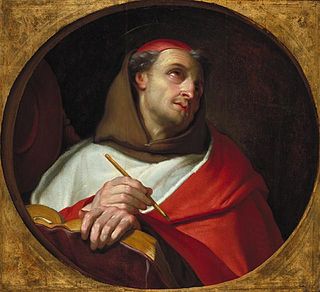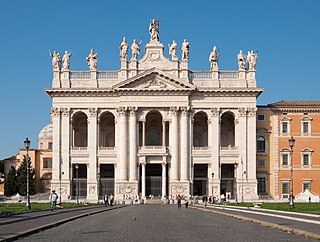
Augustine of Hippo, also known as Saint Augustine, was a theologian and philosopher of Berber origin and the bishop of Hippo Regius in Numidia, Roman North Africa. His writings influenced the development of Western philosophy and Western Christianity, and he is viewed as one of the most important Church Fathers of the Latin Church in the Patristic Period. His many important works include The City of God, On Christian Doctrine, and Confessions.

Original sin is the Christian doctrine that holds that humans, through the act of birth, inherit a tainted nature with a proclivity to sinful conduct in need of regeneration. The biblical basis for the belief is generally found in Genesis 3, in a line in Psalm 51:5, and in Paul's Epistle to the Romans, 5:12-21.
Pre-existence, preexistence, beforelife, or premortal existence, is the belief that each individual human soul existed before mortal conception, and at some point before birth enters or is placed into the body. Concepts of pre-existence can encompass either the belief that the soul came into existence at some time prior to conception or the belief that the soul is eternal. Alternative positions are traducianism and creationism, which both hold that the individual human soul does not come into existence until conception or later. It is to be distinguished from preformation, which is about physical existence and applies to all living things.
In Christian theology, traducianism is a doctrine about the origin of the soul holding that this immaterial aspect is transmitted through natural generation along with the body, the material aspect of human beings. That is, human propagation is of the whole being, both material and immaterial aspects: an individual's soul is derived from the soul of one or both parents. This implies that only the soul of Adam was created directly by God, in contrast with the idea of creationism of the soul, which holds that all souls are created directly by God.

Bonaventure was an Italian Catholic Franciscan bishop, cardinal, scholastic theologian and philosopher.
Premillennialism, in Christian eschatology, is the belief that Jesus will physically return to the Earth before the Millennium, heralding a literal thousand-year messianic age of peace. Premillennialism is based upon a literal interpretation of Revelation 20:1–6 in the New Testament, which describes Jesus's reign in a period of a thousand years.

Christian mysticism is the tradition of mystical practices and mystical theology within Christianity which "concerns the preparation [of the person] for, the consciousness of, and the effect of [...] a direct and transformative presence of God" or divine love. Until the sixth century the practice of what is now called mysticism was referred to by the term contemplatio, c.q. theoria, from contemplatio, "looking at", "gazing at", "being aware of" God or the divine. Christianity took up the use of both the Greek (theoria) and Latin terminology to describe various forms of prayer and the process of coming to know God.

Jovinian was an opponent of Christian asceticism in the 4th century and was condemned as a heretic at synods convened in Rome under Pope Siricius and in Milan by Ambrose in 393 because of his views. Our information about him is derived principally from the work of Jerome in two books, Adversus Jovinianum. Jerome referred to him as the "Epicurus of Christianity". He was a native of Corduene, in present day Turkey. John Henry Newman called Aerius of Sebaste, Jovinian and Vigilantius the forerunners of Protestantism, likening them to the "Luther, Calvin, and Zwingli of the fourth century". Other Protestants also praise Jovinian as an early reformer or even credit him as the "first Protestant". Jovinian's teachings received much popular support in Rome and Milan and his followers Sarmatio and Barbatianus kept preaching his ideas after Jovinian was expelled.
Henry of Ghent, also known as Henricus de Gandavo and Henricus Gandavensis, was a scholastic philosopher who acquired the nickname of Doctor Solemnis.
In religion and philosophy, ensoulment is the moment at which a human or other being gains a soul. Some belief systems maintain that a soul is newly created within a developing child and others, especially in religions that believe in reincarnation, that the soul is pre-existing and added at a particular stage of development.
The "image of God" is a concept and theological doctrine in Judaism and Christianity. It is a foundational aspect of Judeo-Christian belief with regard to the fundamental understanding of human nature. It stems from the primary text in Genesis 1:27, which reads: "So God created man in his own image, in the image of God created he him; male and female he created them." The exact meaning of the phrase has been debated for millennia.

In Christian theology, the doctrine of incarnation teaches that the pre-existent divine person of Jesus Christ, God the Son, the second person of the Trinity, and the eternally begotten Logos, took upon human nature and "was made flesh" by being conceived in the womb of a woman, the Virgin Mary, also known as the Theotokos. The doctrine of the incarnation then entails that Jesus was at the same time both fully God and fully human.
Eastern Orthodox theology is the theology particular to the Eastern Orthodox Church. It is characterized by monotheistic Trinitarianism, belief in the Incarnation of the divine Logos or only-begotten Son of God, cataphatic theology with apophatic theology, a hermeneutic defined by a Sacred Tradition, a catholic ecclesiology, a theology of the person, and a principally recapitulative and therapeutic soteriology.
In Christian theology, the tripartite view (trichotomy) holds that humankind is a composite of three distinct components: body, spirit, and soul. It is in contrast to the bipartite view (dichotomy), where soul and spirit are taken as different terms for the same entity.

In the context of Christian theology, Christian anthropology is the study of the human (anthropos) as it relates to God. It differs from the social science of anthropology, which primarily deals with the comparative study of the physical and social characteristics of humanity across times and places.
The theology on the body is a broad term for Catholic teachings on the human body.

Thomas Aquinas was an Italian Dominican friar and priest, an influential philosopher and theologian, and a jurist in the tradition of scholasticism from the county of Aquino in the Kingdom of Sicily.

The Latin Church is the largest autonomous particular church within the Catholic Church, whose members constitute the vast majority of the 1.3 billion Catholics. The Latin Church is one of 24 churches sui iuris in full communion with the pope; the other 23 are collectively referred to as the Eastern Catholic Churches, and have approximately 18 million members combined.

The Church Fathers, Early Church Fathers, Christian Fathers, or Fathers of the Church were ancient and influential Christian theologians and writers who established the intellectual and doctrinal foundations of Christianity. The historical period in which they worked became known as the Patristic Era and spans approximately from the late 1st to mid-8th centuries, flourishing in particular during the 4th and 5th centuries, when Christianity was in the process of establishing itself as the state church of the Roman Empire.
Although biological evolution has been vocally opposed by some religious groups, many other groups accept the scientific position, sometimes with additions to allow for theological considerations. The positions of such groups are described by terms including "theistic evolution", "theistic evolutionism" or "evolutionary creation". Of all the religious groups included on the chart, Buddhists are the most accepting of evolution. Theistic evolutionists believe that there is a God, that God is the creator of the material universe and all life within, and that biological evolution is a natural process within that creation. Evolution, according to this view, is simply a tool that God employed to develop human life. According to the American Scientific Affiliation, a Christian organization of scientists:
A theory of theistic evolution (TE) — also called evolutionary creation — proposes that God's method of creation was to cleverly design a universe in which everything would naturally evolve. Usually the "evolution" in "theistic evolution" means Total Evolution — astronomical evolution and geological evolution plus chemical evolution and biological evolution — but it can refer only to biological evolution.









